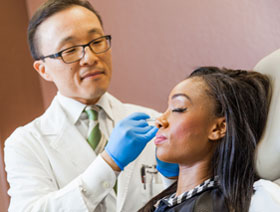 August is Psoriasis Action Month. Over seven million people in the U.S. have psoriasis, so let’s take a closer look at this autoimmune disease that affects the skin.
August is Psoriasis Action Month. Over seven million people in the U.S. have psoriasis, so let’s take a closer look at this autoimmune disease that affects the skin.
First of all, psoriasis isn’t just one disease, it comes in several forms.
● Plaque psoriasis is the most common type and is characterized by dry, raised red lesions covered with silvery scales. These often appear on the scalp, knees, elbows and lower back. They can be itchy or tender to the touch.
● Nail psoriasis causes abnormal nail growth, pitting, and discoloration of the nails. Nails may also detach or crumble.
● Psoriatic arthritis causes swollen painful joints possibly accompanied by skin and nail changes.
● Pustular psoriasis is a rare form of the disease that causes small, pus-filled lesions.
● Guttate psoriasis is characterized by small, drop-shaped lesions that are usually triggered by a bacterial infection (for example, strep throat).
● Inverse psoriasis presents as smooth, red patches in the folds of the skin at the groin, breasts or buttocks which worsen with friction or sweating. It may be triggered by a fungal infection.
● Erythrodermic psoriasis is the most rare form of the disease characterized by a red, peeling rash that can be extremely painful.
All of these forms involve a dysfunction of the immune system. Psoriasis tends to run in families and often occurs in flare-ups separated by periods of less intense symptoms or even remission. There is no cure for psoriasis, but with help from your doctor you can learn to reduce and manage symptoms.
At Arizona Dermatology, we help our patients cope with the disease through a number of treatments. Corticosteroid injections reduce inflammation and the appearance of plaques. Biologic therapies for psoriasis trigger the immune system to block specific proteins that contribute to symptoms, reducing swelling and inflammation. These therapies can be given as an injection or infusion.
We also offer two light-based treatments that work extremely well for psoriasis patients if they are done regularly. UVB light therapy effectively slows the overgrowth of skin cells caused by the disease. We’ve also achieved exceptional results with our Psoralen + UVA treatment. Psoralen is an oral medication taken before treatment that makes the skin more sensitive to UVA rays. Together the medication and exposure to UVA light slow the overgrowth of skin cells characterized by psoriasis.
Even with treatment, living with psoriasis can be challenging. Stress tends to trigger flares, so it is important to reduce and manage stressful situations in your life. Here are some other things you can do at home to make living with psoriasis easier.
Moisturize.
When skin is dry, it makes itching worse. Use gentle soaps and apply a fragrance- and dye-free moisturizer daily. Consider running a humidifier in your bedroom.
Cool off.
Hot air and hot water can also trigger itching. Baths and showers should be taken in warm (not hot) water. Use air conditioning when you can and keep ice packs in your freezer for relief.
Avoid scratching.
Scratching may give momentary relief, but it activates nerve endings, ultimately making the itching worse. Skin coverings can help you avoid the temptation to scratch. If itching is unmanageable, talk to your doctor. We can prescribe medications to bring relief.
A few things you probably didn’t know about psoriasis:
1. Smoking triggers psoriasis. And if you already have the disease, it makes it worse. Researchers are still trying to figure out why this is the case, but a correlation undoubtedly exists between lighting up and flaring up.
2. Psoriasis and depression are linked. People with psoriasis have greater rates of depression. It could be the effects of living with pain, discomfort and a visible skin disease, or the correlation could be more complex. Regardless, if you are experiencing depression or sadness, getting treatment for your psoriasis could help your mood as well as your skin.
3. Losing weight can help your psoriasis. Obesity is associated with higher levels of inflammation in the body, which can have an impact on inflammatory diseases like psoriasis.
While there is no cure for psoriasis at the moment, researchers are continually looking into safe, effective treatments to improve the lives of people with psoriasis. One of those is the possibility of “turning off” certain genes that are believed to trigger the onset of the disease and reduce flare ups. They are also working on a gel with microscopic spheres of genetic material that can stop the body from making inflammatory proteins that contribute to symptoms.
More than anything, we want people with psoriasis to know that there are effective treatments available and you can live a happy, healthy life with psoriasis. Give us a call today.


